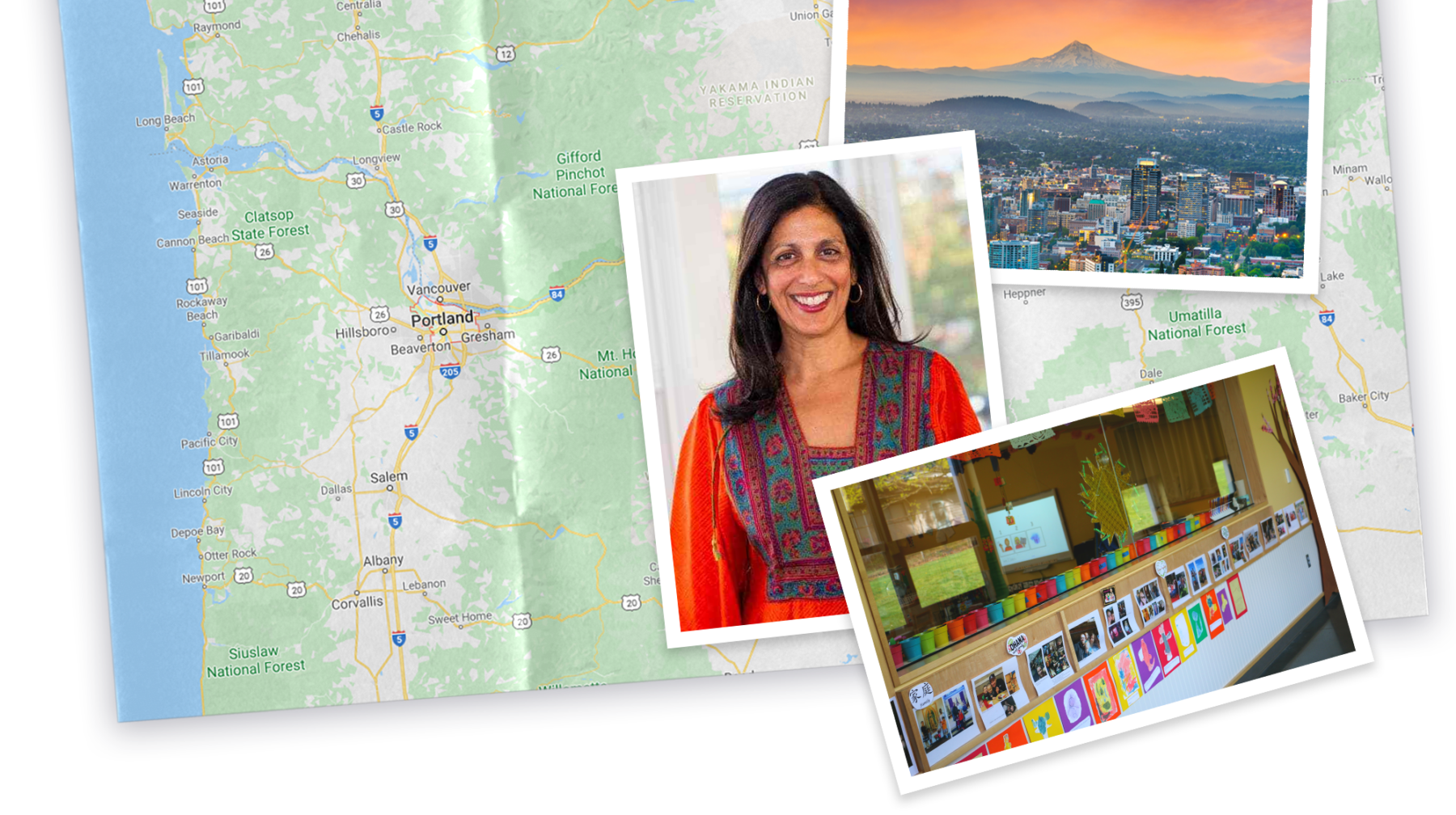
Swati Adarkar is working to improve the educational opportunities for all children in Oregon through advocacy and action.
Photos courtesy of Children’s Institute and from iStock
Bright and early
“Talk, sing, play. Believe it or not, that’s the foundation.”
The early experiences children get in their first eight years are crucial to their future as learners.
“Talk, sing, play. Believe it or not, that’s the foundation,” said Swati Adarkar, M.P.A. ’89, president and CEO of Children’s Institute, an education nonprofit in Oregon. “It sounds so soft, but those are very directly connected to language acquisition, executive function, and social emotional development.”
Adarkar explained that despite all the research supporting the importance of these activities, they aren’t regular features in the lives of some children, often because their communities don’t provide equitable access to early education opportunities and because parents aren’t able to afford it.
Adarkar and Children’s Institute suspected that the lack of access in parts of the state could be a contributing factor in the gaps in education benchmarks like third grade reading levels and the state’s low graduation rates. So 10 years ago, they created the Early Works initiative as a learning laboratory to demonstrate how to effectively connect early education and the elementary grades, and to inform the advocacy agenda.
“The reason we took up the Early Works Initiative is a belief that what we lacked societally is a tangible vision. What would it look like on the ground if we actually put in place a set of strategies that children and families need as a proof point to influence policy,” said Adarkar, who combines her community experience with the leadership skills she acquired at Harvard Kennedy School to develop holistic solutions to complex problems.
The project focused on assessing and addressing the community needs for two Oregon schools in lower-income communities — Earl Boyles Elementary and Yoncalla Elementary — the first a diverse, urban school in Portland and the second an isolated, rural school about 150 miles south.
To start, Children’s Institute worked with Portland State University to train parents in both towns to perform community research — going door to door collecting data on what residents viewed as problem areas. The responses made clear that other needs like health care and food security weren’t being met, in addition to those needs directly involved in education, like preschool and afterschool programs. They then sat down with business leaders, community leaders, families, community partners, and the school principals and superintendents to find solutions and funding.
Over the last decade, Early Works helped develop new opportunities at Portland’s Earl Boyles Elementary. Adarkar was excited to point out that public school now begins at 3, there is a publicly funded preschool, infant and toddler play groups, positive behavior support, housing supports, and a food pantry.
Adarkar added that the program also fostered an active group of parents who help guide the initiative by monitoring and informing Early Works of how the community’s needs continue to change over time.
“It’s remarkable. When we started the project at Earl Boyles the kids were coming in two years behind their more affluent peers on measures of early literacy, numeracy, and social emotional skills at kindergarten entry, and now we’re seeing them outperform their district peers and the state average.”
At rural Yoncalla Elementary, the community participatory research revealed a dire problem.
“The health outcomes for that whole region, North Douglas [County], are [up to] three times worse than the rest of the state. And the health services were just nonexistent. So the community, through this door-knocking strategy, was able to identify health services as a key need,” Adarkar said. “They now partner with one of the health providers there to have a satellite clinic [in the nearby town of Drain] open one day a week for services. And they’re going to continue, hopefully, to add more days.”
Early Works, originally planned as a 10-year project, is now set to continue in its mission of lifting up the children it serves. Not only will Children’s Institute continue in the two established schools, they have raised sufficient funds to pilot Early School Success, an initiative informed by Early Works to support K–12 educators in two more communities, Beaverton and Forest Grove.
They also helped form an early childhood coalition, which last year successfully advocated for a state-wide $1 billion educational investment, with $200 million allocated for early childhood education.
Children’s Institute’s partnerships developed through these initiatives shape the organization’s understanding of how policy connects to effective implementation and informs their advocacy agenda.
“You can say, ‘Children need early health care, and they need preschool, etc.’ and everyone will say, ‘Of course they do.’” Adarkar said. “So it’s not so much the ‘why’ … but it’s the ‘how.’ How do you go about doing this and sustaining change over time?” Which is what Adarkar and Children’s Institute will continue to answer through advocacy and action.
This story is part of the To Serve Better series, exploring connections between Harvard and neighborhoods across the United States.




